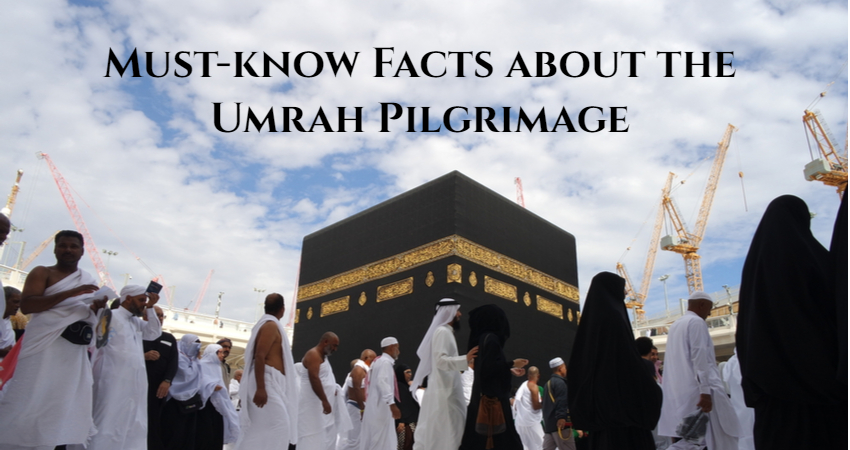Umrah is the non-obligatory pilgrimage journey that thousands of pilgrims or Mu’tamars opt for every year. This spiritual journey to the Islamic holy city of Makkah and Madina offers a blissful experience to the pilgrims. In this soul-lifting path, Muslim pilgrims seek forgiveness and pray for redemption from the almighty Allah. Despite its popularity, there are many facts about Umrah pilgrimage that most Muslims are not aware of.
And hence, simply deciding to perform Umrah is not enough. One must know all the relevant facts about Umrah to obtain a peaceful experience and complete the sacred ritual of Umrah successfully. Moreover, knowing the history, rules, and penalties can make one more prepared for the arduous yet satisfactory spiritual journey.
Umrah Meaning
Finding the perfect Umrah definition is not easy. In simple terms it is a pilgrimage to the house of Allah, the holy Kaaba in the sacred land of Makkah. That is how most people understand it. But for those who perform it purest intentions and complete devotion to Allah, it is a journey that transform one as a human. It is a life-altering experience, second only to Hajj, the ultimate pilgrimage, also performed at Masjid Al Haram in Makkah. Understanding Umrah facts is only a beginning to understand the meaning of Umrah. So, let’s start.
20 Umrah Facts You Must Be Aware Of
To complete Umrah pilgrimage without any amateur mistakes one must know some vital facts about Umrah. Understanding these points would make the journey more fulfilling and joyous to the pilgrims. Check out the most popular Umrah facts listed here to know more.
- The literal translation of Umrah is ‘to visit a populated place’.
- In its present form, the Umrah pilgrimage dates back to Prophet Muhammad’s (PBUH) lifetime and is a composite of several pre-Islamic ceremonies that were reinterpreted in monotheistic terms and supplemented by Muslim prayers.
- Prophet Muhammad (PBUH) performed Umrah four times in his lifetime.
- Visas issued to Hajj and Umrah pilgrims specify the duration for which a pilgrim can stay in the country. Penalties for overstays carry a fine of 50,000 SAR or more, six months incarceration and deportation.
- One of the most interesting Umrah facts is that people used to circumambulate around Kaaba even before the introduction of Islam.
- It is believed that the holy Kaaba was first built by Adam, then later by prophet Ibrahim (peace be upon him) and then by his son Ismail (peace be upon him).
- The Kaaba is considered the house of Allah, and therefore Umrah pilgrims are considered the guests of Allah.
- As per a Hadith, and also one of the important facts about Umrah, performing Umrah during Ramadan is equal to performing Hajj.
- It is a known fact that the use of mobile phones is to be avoided as much as possible but the sole reason behind this is to avoid the concentration and energy of the pilgrim to diverge from the pilgrimage. It is one of the key facts about Umrah that should be kept in mind.
- It is known that Saee is performed to pay homage to Hagar, the wife of Prophet Ibrahim (PBUH) and her quest between the hills of Safa and Marwa to quench the thirst of her little son, Ismael.
- Also by Allah Almighty’s miracle the well of ZamZam sprang out from beneath little Prophet Ismail’s(PBUH) feet. The name ZamZam was given to it as Hagar ordered it to cease its flow by saying Zome Zome, which means to stop.
- There are two different types of Umrah, Umrah al-Tamattu, which is conducted in the months of Hajj; and Umrah al-Mufradah, which can be performed anytime during the year, except for the months of Hajj.
- Miqat is the place where pilgrims start the journey of Umrah. It is in these places that the pilgrims put on the Ihram clothing. There are five Miqats, which include Yalamlam or al-Sadiah, Dhat Irq, Al-Juhfah or Rabigh, Qarn al-Manazil or al-Sayl, and Al-Juhfah or Rabigh.
- While wearing Ihram, men and women must understand the concept of Satar, or the area of the body that must be covered up. It is dictated that to wear Ihram for Umrah, men must cover their chest and legs till their knees while they are forbidden to cover their ankles and head. Women must cover their hair and the complete body.
- It is known that one should offer two rakats after performing Tawaf, in front of Maqam-e-Ibrahim, but did you know that Maqam-e-Ibrahim is a stone which, by the mercy of Allah Almighty, softened when Prophet Ibrahim(PBUH) stood on it to call people for Umrah and Hajj. As a result, his footprints were engraved on it, which can be seen even today.
- Male pilgrims are required to shave their heads to successfully complete Umrah. However, the female pilgrims only need to cut hair that is equivalent to the fingertip length. These rituals are called Halq and Taqsir respectively.
- If a man has no hair on his head, he still needs to clean his scalp with a razor exactly the same way as Halq is performed.
- If mistakes are committed during Umrah, then one has to atone for them through expiation or Fidyah. There are three types of Umrah penalties. These are – Badanah, Damm and Sadaqah. Depending on the severity of the mistake, one has to offer the required Fidyah. Knowing these facts about Umrah helps people to make proper expiation for their mistakes.
- Women under the age of 45 must be accompanied by a mahram, an adult male family member or relative.
- Women over 45 are permitted to travel without a mahram, when in a group.
These facts about Umrah will go a long way in enriching the pilgrimage and adding more soul to your journey to the house of all merciful Allah.
Umrah Facts FAQs
What is the meaning of Umrah?
The word Umrah translates to ‘visiting a populated place’.
Why is the Zamzam well important?
The Zamzam well sprang out from beneath the feet of infant Ismail, the son of Prophet Ibrahim
Who built the holy Kaaba?
The holy Kaaba was first built by Adam and then by Prophet Ibrahim, peace and blessings be upon him








